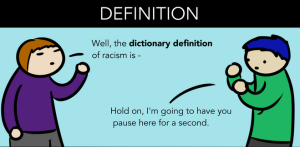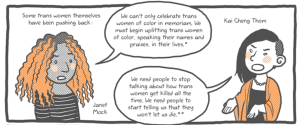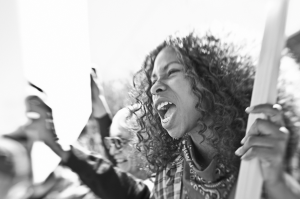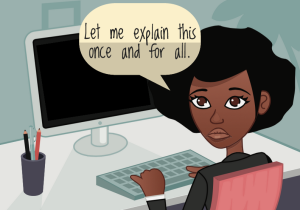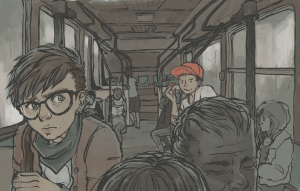CELIA: Hey y’all. This is another video in a series I’m doing with Everyday Feminism, which is a website dedicated to helping you break down and stand up to everyday oppression. In this video, I want to discuss some common stereotypes about mentally ill people that you probably, maybe, believe and why you shouldn’t believe them.
So, the first one: “we’re violent,” because the vast majority of us are not violent, and this stereotype is exaggerated and made worse by the media all the time, especially after a white man commits some horrible mass attack on innocent people. “It was his mental illness,” they tell us. “He was troubled. Don’t blame society; he was sick.”
But those of us who are really struggling with mental illness are stigmatized every time this misinformation is spread. Studies have shown that people with severe mental illness – so the types that are the most stigmatized – are two-and-a-half times more likely to be attacked or assaulted than the general population. Mental illness puts people in a vulnerable position, and the social stigma around us only adds salt to the wound.
And this stereotype isn’t going away, either. A study that took place over 46 years found that the proportion of America who describe mental illness as consistent with violence nearly doubled over that time. I hear this stereotype every time some lone white gunman terrorizes a school or a movie theater.
People are just trying to find a way to explain some truly horrific behavior in a way that doesn’t challenge the status quo, so if it’s not about the way we raise men in society and it’s not about white privilege and entitlement, then it must be that he was really mentally ill.
But this stereotype hurts those of us who are really struggling. The stigma leads others to avoid living, socializing, and working with mentally ill people, especially those with severe disorders like schizophrenia or bipolar disorder. These systemic issues also lead the mentally ill to internalize these messages and feel even less able to seek help.
The second stereotype about us is that we’re “just not trying hard enough,” and as someone who struggles with depression, this common stereotype about us hurts very deeply. I don’t simply lack motivation and I can’t snap out of my depression by just trying harder to be happy, or leaving the house more, or going to yoga, or something.
Minimizing my symptoms and my struggles to survive them is frustrating, it’s disempowering, and honestly, it’s dangerous; because if you’re already struggling to get out of bed because you feel so low and guilt-ridden and weak, someone telling you to try harder is the last thing you need.
The third stereotype is that “physical illnesses are more legitimate or serious,” and people often forget just how physical mental illness is. Just because the source of my struggle is my brain doesn’t mean it’s not physical. I mean, the brain is, after all, a physical part of me.
And mental illness affects the body, too. My anxiety disorder gives me stomach aches, diarrhea, night sweats, jaw pain, heart palpitations, nausea. My depression takes away my ability to sleep at night or do anything but sleep in the day, takes away my appetite, makes my thoughts fuzzy and unfocused.
These symptoms may be the result of some chemical imbalance in my brain. They may be mental in their source. But they manifest themselves in my body in a very real way. And physical illnesses are serious and valid, and I’m not trying to downplay them at all. Mental illness, however, does exist outside of the mind, so let’s not forget that.
And the last stereotype I want to talk about is that “mental illness can’t be treated.” So, just because mental illness isn’t understood in its totality yet doesn’t mean that it’s untreatable or that the outcome has to be bad. There are treatments for most, if not all, mental illnesses.
As many as 80% of people suffering from mental illness can maintain their normal lives if they receive appropriate treatment, so that means whatever works for them; it could be medication, therapy, a combination, et cetera. And when living how they once did isn’t possible, suffering as a result of one’s mental illness can be reduced significantly when you seek help. Help is out there. Bias and stigma against the mentally ill is real, but there is real hope, too. And if you’re struggling, you’re not alone. You’re not broken. You need help, and there’s nothing weak about asking for that.
If I hadn’t reached out for help last year during a depressive episode, I would not be where I am today.
So, mental illness directly affects almost a quarter of Americans, and almost half of us struggling don’t seek treatment. Stereotypes like these ones I discussed discourage us. They encourage fear and discrimination against us, but we’re not dangerous, violent, and unpredictable threats. We’re people doing our best to survive despite our brains sometimes working against us.
Think before you blame mental illness for the latest domestic terrorist attack. The next time mental illness is made into the villain or the punch-line of a joke on TV, consider what it’s really saying. Before you assume you understand what someone is going through, remember you probably don’t.
I hope this was helpful. Thanks for watching, and I’ll see you all in my next video.






